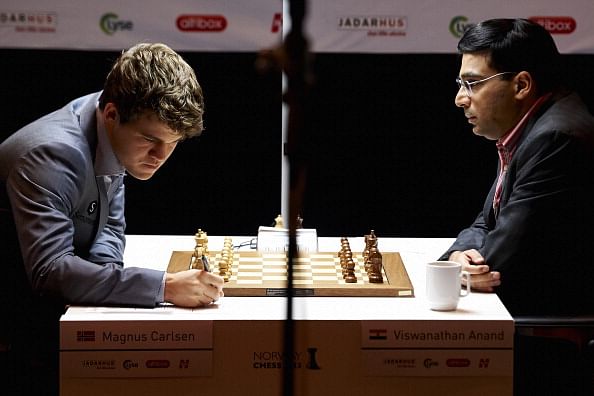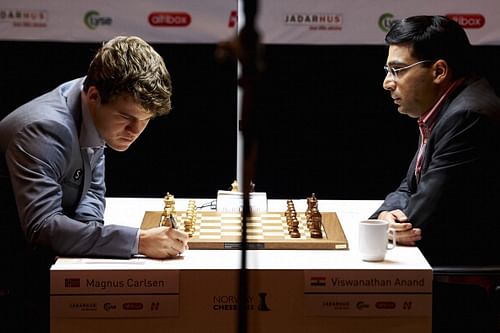
World Chess Championship 2013: Cheating impossible in Viswanathan Anand vs Magnus Carlsen match

India’s Viswanathan Anand (R) playing against Norway`s Magnus Carlsen during the Norway Chess 2013 Blitz tournament in Sandnes near Stavanger, on May 9, 2013. (Kent Skibstad/AFP/Getty Images)
Not that the integrity of either World Chess Champion Viswanathan Anand or World No. 1 Magnus Carlsen is doubted, yet the players will have to reach the playing hall at Hotel Hyatt Regency in Chennai, 10 minutes before the start time of the game.
We did witness an elaborate security check for players at the recently-concluded World Cup in Tromso, Norway. Something similar will be implemented in Chennai. It is the entire chess community’s responsibility to ensure that fair play is endorsed at all levels in the sport.
A mandatory security check will be conducted on both the chess players. Only the players and stewards shall be allowed in the actual playing area except with the permission of the Chief Arbiter or his Deputy. Both players will have access to the same toilet facilities during the games. There will be no separate rest rooms for the players during the games. Both players shall use the same rest lounge area which shall be on/at the stage and visible by the Arbiter and the spectators, according to the FIDE regulations.
During the playing session the following additional regulations shall be in force:
- The players are not permitted to bring into the playing area telephone, technical and other equipment extraneous to play, which may in any way disturb or upset the opponent. The Chief Arbiter shall decide what constitutes extraneous equipment liable to offend the opponent.
- A player may communicate with an arbiter.
- During the playing session, a player may leave the playing area only with the permission of the Chief Arbiter and only if he is accompanied by one of the arbiters.
- The games will be played in a soundproof area that would be cut off from the audience and journalists by a glass partition.
For any infringement of these rules, the Chief Arbiter shall have the right to impose a fine of not more than 5,000 (five thousand) euro. The player may protest to the Appeals Committee in accordance to the proceedings laid out in the FIDE handbook.
The FIDE President shall nominate, from within the Presidential Board, three members of the Appeals Committee, one of whom shall be Chairman. All protests must be submitted in writing to the Appeals Committee not more than two (2) hours after the finish of the relevant playing session, or the particular infringement complained against.
The Appeals Committee may decide on the following matters:
a) an appeal against a decision by an arbiter,
b) a protest against a player’s behaviour,
c) a complaint alleging false interpretation of the regulations,
d) a request for the interpretation of specific regulations,
e) a protest or complaint against any participant, or
f) all other matters which the Appeals Committee considers important.
If possible, the Appeals Committee shall reach a decision not more than two (2) hours after the submission of a protest. The appeals process shall include written representations and a written decision. The Appeals Committee shall endeavor to find binding solutions that are within the spirit of the FIDE motto, Gens Una Sumus.
Each protest must be accompanied by a deposit fee of €3000 (three thousand Euros) or the equivalent in local currency. This can also be done if the player makes a written request that FIDE withholds the fee from his prize money. If the protest is accepted, the fee shall be returned. If the protest is rejected, the fee may be forfeited to FIDE. The written decision of the Appeals Committee arising from any dispute in respect of these regulations shall be final.